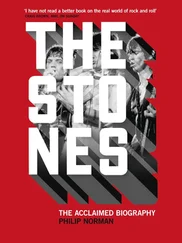But of the four, only Mimi had remained childless. Her explanation was that she’d had to be a mother to the others during their girlhood, and didn’t want to go through it all again. She was, in fact, thought not to care very much for small children, preferring them when they grew older and could join in intelligent conversation about things she cared for, such as reading and music.
From gentle George Smith, Mimi received social standing as a farmer’s wife in a salubrious part-rural area, and a home that more than met her exacting standards. This was a house named Mendips, at 251 Menlove Avenue, Woolton, where the couple took up residence in 1942. Even to someone less attuned to nuances of class, the dwelling proclaimed its superiority in diverse ways: the fact that it was semi-detached rather than terraced; that, instead of plain brick, it was coated in knobby grey pebble dash; that it stood on an avenue, so much more exclusive-sounding than a mere street or road; above all that, far from being just a number on the postman’s round, it also had a name, grandiosely identifying it with the range of hills in far-off Somerset.
On the inside, Mendips was designed to suggest an Elizabethan manor house. Its entrance hall had a half-timbered finish, the lower beams serving as display shelves for Mimi’s prized collection of Royal Worcester and Coalport china. The baronial-looking staircase ascended past a large stained-glass window inset with a Tudor rose motif. The remaining windows had stained-glass borders decorated with Art Nouveau flowers. In addition to the ground-floor living room and dining room, there was the country-manor touch of a morning room, a space rather more modest than its title suggests, immediately adjacent to the kitchen. When the house had been built in 1933, its first owners would have employed a uniformed housemaid rather than just an occasional cleaning lady. Above the morning-room door still hung a board with a row of five panels, indicating where electric bells once summoned the maid to the dining room, drawing room, front door, front bedroom or back bedroom. Yes, the future self-proclaimed working-class hero grew up in a house equipped with servants’ bells.
Mimi always described her acquisition of John solely in terms of family duty—the habit ingrained since childhood of straightening out her younger sister’s muddles. ‘Julia had met someone else, with whom she had a chance of happiness,’ she would say. ‘And no man wants another man’s child.…’ In fact, the relationship between Julia and her headwaiter, Bobby Dykins, had never excluded John in any way. Far from discriminating against ‘another man’s child’, Dykins was prepared to bring John up as if he were his own. He was serious enough about this to have persuaded Julia to move out of 9 Newcastle Road with John and into a small rented flat in Gateacre, where the hoped-for family unit might evolve with less pressure from her relatives.
But for Mimi, Julia’s ‘living in sin’ so publicly with Dykins threatened to make her sister the object of scandalised gossip such as even Alf Lennon had never visited on the super-respectable Stanley family. Julia might be old enough to lead her own life, but little John should not have to live in such an atmosphere of moral laxity.
Mimi had other motives, too, compounded not only of her unassailable moral certitude but also her reluctance or inability to have a baby by the usual channels, and the almost mystical affinity she had felt with John since first seeing him newly born in his mother’s arms. ‘She decided she wanted him,’ her niece Liela Harvey says. ‘And who could blame her, because he was the cutest little fellow you ever saw.’
Mimi therefore enlisted her father in a campaign against Julia and Dykins that today might almost be defined as harassment. One day, she and Pop Stanley both turned up unannounced at the Gateacre flat, declaring it an unfit place for John to live and demanding to remove him. But Julia, supported by Dykins, refused to give him up. Mimi then sought the intervention of a Liverpool Corporation child-welfare officer, who visited the flat and expressed concern that John was sharing Julia and Dykins’ bedroom. Even by the puritanical ethos of 1940s welfare services, this was not sufficient reason to separate him from his mother. Such a decision could only be Julia’s.
Despite the Stanleys’ disparaging nickname of Spiv (war slang for a small-time shyster), Dykins was generally a kindly and civilised man. However, when he took a drink too many, the suave, decorous headwaiter turned into an all-too-typical Liverpool male who could ‘lose his rag’ in an instant, bellowing abuse at Julia, sometimes hitting her. And, as ever in times of emergency, her oldest sister was her first port of call. One day while John was with Mimi at Mendips, his mother came in, as he later remembered, ‘wearing a black coat and with her face bleeding’. He was told she had had an accident, but clearly suspected something more sinister. ‘I went out into the garden,’ he recalled. ‘I loved her, but I didn’t want to get involved. I suppose I was a moral coward. I wanted to hide all feelings.’
The upshot was a furious argument between the sisters, as Mimi herself later recounted, which yet again dragged up Julia’s wartime affair with the Welsh soldier, and baby Victoria Elizabeth. ‘[Julia] was looking for sympathy but as far as I was concerned she’d made her bed and had to lie on it, and I told her “You’re not fit to be a mother.” She reacted like I’d slapped her in the face. I just said I think I should have John…[it] just seemed to make sense. George was very fond of him. In many ways our house was a lot quieter than the places he’d been living in and we could give him some stability. He’d had a bit of a bumpy ride up till then.’
In Mimi’s version, Julia was by now ready to agree willingly, even thankfully. But John’s cousin Liela, who was also in the room, saw a very different end to the long tug-of-love. ‘I remember Mimi standing in front of John and telling Julia, “You’re not having him.”’
Once she had won him, Mimi devoted herself completely to John’s care. What little social life she and George used to enjoy she willingly sacrificed; in later life it would be her proud boast that ‘for 10 years [after John was in bed] I never crossed the threshold of that house at night.’ She was careful always to leave a light on outside his room, until a voice sternly called after her, ‘Mimi…don’t waste light!’
Mimi gave John’s life an order and structure he had never known with easy-going Julia—meals served as regularly as clockwork, bed at the same fixed (early) hour each night, baths and shampoos a regular ritual in the house’s single bathroom with its black-and-white chequered lino and freestanding claw-footed tub. Before meals—usually served in the morning room but sometimes in the rather sombre rear dining room—he would be called on to say grace. He was not allowed to come to the table without first washing his hands, or to leave it without asking, ‘May I get down?’
Above all, Mimi was determined that he should speak like a nice middle-class boy from the suburbs, not a coarse, raucous ‘wacker.’ Under her tutelage, there was soon not the slightest taint of innercity Liverpool in John’s voice. ‘I had high hopes for [him] and I knew you didn’t get anywhere if you spoke like a ruffian. I remember once he came home from town on the bus and he’d heard these Liverpudlians talking to each other—Scouse, you know—and he was shocked, he couldn’t understand what they were talking about…I told him he should avoid people like that…He was a country boy…he would never meet [them] except if anyone came to the house to mend something. It was a world away really.’
Читать дальше












![John Bruce - The Lettsomian Lectures on Diseases and Disorders of the Heart and Arteries in Middle and Advanced Life [1900-1901]](/books/749387/john-bruce-the-lettsomian-lectures-on-diseases-and-disorders-of-the-heart-and-arteries-in-middle-and-advanced-life-1900-1901-thumb.webp)